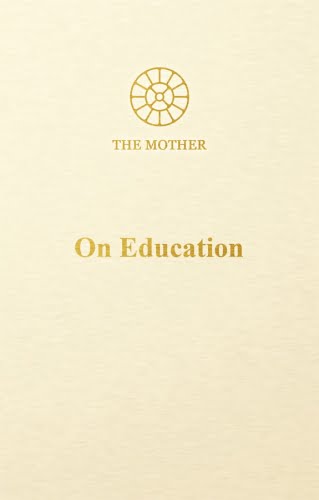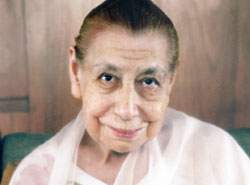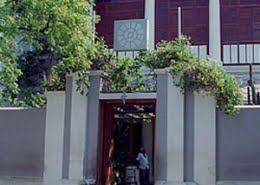On Education (CWM Vol.12)
On Education
Collected Works of the Mother Volume 12
This volume is a compilation of the Mother’s articles, messages, letters and conversations on education. Three dramas, written for the annual dramatic performance of the Sri Aurobindo International Centre of Education, are also included.
PART ONE. ARTICLES
The fifteen articles here were first published in the Bulletin of Physical Education (later renamed Bulletin of Sri Aurobindo International Centre of Education) between 1949 and 1955. The Mother wrote them in French and translated a few, entirely or in part, into English; in this volume, these translations have been retained. The original translations made by others have been revised or new translations made.
PART TWO. MESSAGES, LETTERS AND CONVERSATIONS
PART THREE. DRAMAS
The Mother wrote three dramas in French for the dramatic performance held annually on December 1 by the students and teachers of the Centre of Education. Towards the Future was produced in 1949, The Great Secret in 1954 and The Ascent to Truth in 1957. Each play was issued as a booklet immediately after its performance, with the text in both French and English. For this volume, the original translations have been revised. For The Great Secret, the Mother wrote the parts of the Statesman, the Artist and the Unknown Man; the parts of the four other characters were written, in consultation with the Mother, by those who played the roles. The parts of the Writer and the Athlete were written in English. A letter to the person who portrayed the Industrialist is included as an introduction to the drama.
Book Details
Author: The Mother
Print Length: 534 pages
Publisher: Sri Aurobindo Ashram
Book format: PDF, ePub, Kindle
Language: English
Book Download
Contents
Part One. Articles
- The Science of Living
- Education
- Physical Education
- Vital Education
- Mental Education
- Psychic Education and Spiritual Education
- An International University Centre
- The Four Austerities and the Four Liberations
- To the Students, Young and Old
- Foresight
- Transformation
- The Fear of Death and the Four Methods of Conquering It
- A Dream
- Helping Humanity
- The Problem of Woman
Part Two. Messages, Letters and Conversations
- I. Sri Aurobindo International Centre of Education
- II. Sri Aurobindo Ashram Department of Physical Education
- III. The New Age Association
- IV. A Glimpse of Mother’s Work in the School
- V. Answers to a Monitress
- VI. Answers to a Monitor
- VII. Conversations
Part Three. Dramas
- Towards the Future
- The Great Secret
- The Ascent to Truth
Book Sample
On Education
The Science of Living
To know oneself and to control oneself
AN AIMLESS life is always a miserable life. Every one of you should have an aim. But do not forget that on the quality of your aim will depend the quality of your life.
Your aim should be high and wide, generous and disinterested; this will make your life precious to yourself and to others.
But whatever your ideal, it cannot be perfectly realised unless you have realised perfection in yourself.
To work for your perfection, the first step is to become conscious of yourself, of the different parts of your being and their respective activities. You must learn to distinguish these different parts one from another, so that you may become clearly aware of the origin of the movements that occur in you, the many impulses, reactions and conflicting wills that drive you to action. It is an assiduous study which demands much perseverance and sincerity. For man’s nature, especially his mental nature, has a spontaneous tendency to give a favourable explanation for everything he thinks, feels, says and does. It is only by observing these movements with great care, by bringing them, as it were, before the tribunal of our highest ideal, with a sincere will to submit to its judgment, that we can hope to form in ourselves a discernment that never errs. For if we truly want to progress and acquire the capacity of knowing the truth of our being, that is to say, what we are truly created for, what we can call our mission upon earth, then we must, in a very regular and constant manner, reject from us or eliminate in us whatever contradicts the truth of our existence, whatever is opposed to it. In this way, little by little, all the parts, all the elements of our being can be organised into a homogeneous whole around our psychic centre. This work of unification requires much time to be brought to some degree of perfection. Therefore, in order to accomplish it, we must arm ourselves with patience and endurance, with a determination to prolong our life as long as necessary for the success of our endeavour.
As you pursue this labour of purification and unification, you must at the same time take great care to perfect the external and instrumental part of your being. When the higher truth manifests, it must find in you a mind that is supple and rich enough to be able to give the idea that seeks to express itself a form of thought which preserves its force and clarity. This thought, again, when it seeks to clothe itself in words, must find in you a sufficient power of expression so that the words reveal the thought and do not deform it. And the formula in which you embody the truth should be manifested in all your feelings, all your acts of will, all your actions, in all the movements of your being. Finally, these movements themselves should, by constant effort, attain their highest perfection.
All this can be realised by means of a fourfold discipline, the general outline of which is given here. The four aspects of the discipline do not exclude each other, and can be followed at the same time; indeed, this is preferable. The starting-point is what can be called the psychic discipline. We give the name “psychic” to the psychological centre of our being, the seat within us of the highest truth of our existence, that which can know this truth and set it in movement. It is therefore of capital importance to become conscious of its presence in us, to concentrate on this presence until it becomes a living fact for us and we can identify ourselves with it.
In various times and places many methods have been prescribed for attaining this perception and ultimately achieving this identification. Some methods are psychological, some religious, some even mechanical. In reality, everyone has to find the one which suits him best, and if one has an ardent and steadfast aspiration, a persistent and dynamic will, one is sure to meet, in one way or another — outwardly through reading and study, inwardly through concentration, meditation, revelation and experience — the help one needs to reach the goal. Only one thing is absolutely indispensable: the will to discover and to realise. This discovery and realisation should be the primary preoccupation of our being, the pearl of great price which we must acquire at any cost. Whatever you do, whatever your occupations and activities, the will to find the truth of your being and to unite with it must be always living and present behind all that you do, all that you feel, all that you think.
To complement this movement of inner discovery, it would be good not to neglect the development of the mind. For the mental instrument can equally be a great help or a great hindrance. In its natural state the human mind is always limited in its vision, narrow in its understanding, rigid in its conceptions, and a constant effort is therefore needed to widen it, to make it more supple and profound. So it is very necessary to consider everything from as many points of view as possible. Towards this end, there is an exercise which gives great suppleness and elevation to the thought. It is as follows: a clearly formulated thesis is set; against it is opposed its antithesis, formulated with the same precision. Then by careful reflection the problem must be widened or transcended until a synthesis is found which unites the two contraries in a larger, higher and more comprehensive idea.
Many other exercises of the same kind can be undertaken; some have a beneficial effect on the character and so possess a double advantage: that of educating the mind and that of establishing control over the feelings and their consequences. For example, you must never allow your mind to judge things and people, for the mind is not an instrument of knowledge; it is incapable of finding knowledge, but it must be moved by knowledge. Knowledge belongs to a much higher domain than that of the human mind, far above the region of pure ideas. The mind has to be silent and attentive to receive knowledge from above and manifest it. For it is an instrument of formation, of organisation and action, and it is in these functions that it attains its full value and real usefulness.
There is another practice which can be very helpful to the progress of the consciousness. Whenever there is a disagreement on any matter, such as a decision to be taken, or an action to be carried out, one must never remain closed up in one’s own conception or point of view. On the contrary, one must make an effort to understand the other’s point of view, to put oneself in his place and, instead of quarrelling or even fighting, find the solution which can reasonably satisfy both parties; there always is one for men of goodwill.
Here we must mention the discipline of the vital. The vital being in us is the seat of impulses and desires, of enthusiasm and violence, of dynamic energy and desperate depressions, of passions and revolts. It can set everything in motion, build and realise; but it can also destroy and mar everything. Thus it may be the most difficult part to discipline in the human being. It is a long and exacting labour requiring great patience and perfect sincerity, for without sincerity you will deceive yourself from the very outset, and all endeavour for progress will be in vain. With the collaboration of the vital no realisation seems impossible, no transformation impracticable. But the difficulty lies in securing this constant collaboration. The vital is a good worker, but most often it seeks its own satisfaction. If that is refused, totally or even partially, the vital gets vexed, sulks and goes on strike. Its energy disappears more or less completely and in its place leaves disgust for people and things, discouragement or revolt, depression and dissatisfaction. At such moments it is good to remain quiet and refuse to act; for these are the times when one does stupid things and in a few moments one can destroy or spoil the progress that has been made during months of regular effort. These crises are shorter and less dangerous for those who have established a contact with their psychic being which is sufficient to keep alive in them the flame of aspiration and the consciousness of the ideal to be realised. They can, with the help of this consciousness, deal with their vital as one deals with a rebellious child, with patience and perseverance, showing it the truth and light, endeavouring to convince it and awaken in it the goodwill which has been veiled for a time. By means of such patient intervention each crisis can be turned into a new progress, into one more step towards the goal. Progress may be slow, relapses may be frequent, but if a courageous will is maintained, one is sure to triumph one day and see all difficulties melt and vanish before the radiance of the truth-consciousness.
Lastly, by means of a rational and discerning physical education, we must make our body strong and supple enough to become a fit instrument in the material world for the truth-force which wants to manifest through us.
In fact, the body must not rule, it must obey. By its very nature it is a docile and faithful servant. Unfortunately, it rarely has the capacity of discernment it ought to have with regard to its masters, the mind and the vital. It obeys them blindly, at the cost of its own well-being. The mind with its dogmas, its rigid and arbitrary principles, the vital with its passions, its excesses and dissipations soon destroy the natural balance of the body and create in it fatigue, exhaustion and disease. It must be freed from this tyranny and this can be done only through a constant union with the psychic centre of the being. The body has a wonderful capacity of adaptation and endurance. It is able to do so many more things than one usually imagines. If, instead of the ignorant and despotic masters that now govern it, it is ruled by the central truth of the being, you will be amazed at what it is capable of doing. Calm and quiet, strong and poised, at every minute it will be able to put forth the effort that is demanded of it, for it will have learnt to find rest in action and to recuperate, through contact with the universal forces, the energies it expends consciously and usefully. In this sound and balanced life a new harmony will manifest in the body, reflecting the harmony of the higher regions, which will give it perfect proportions and ideal beauty of form. And this harmony will be progressive, for the truth of the being is never static; it is a perpetual unfolding of a growing perfection that is more and more total and comprehensive. As soon as the body has learnt to follow this movement of progressive harmony, it will be possible for it to escape, through a continuous process of transformation, from the necessity of disintegration and destruction. Thus the irrevocable law of death will no longer have any reason to exist.
When we reach this degree of perfection which is our goal, we shall perceive that the truth we seek is made up of four major aspects: Love, Knowledge, Power and Beauty. These four attributes of the Truth will express themselves spontaneously in our being. The psychic will be the vehicle of true and pure love, the mind will be the vehicle of infallible knowledge, the vital will manifest an invincible power and strength and the body will be the expression of a perfect beauty and harmony.
Bulletin, November 1950
…




